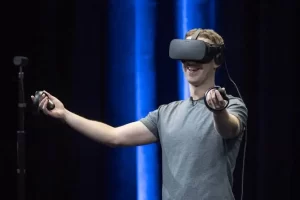Meta, the parent company of Facebook and Instagram, made announcement concerning the decision on lowering the minimum age for its virtual reality (VR) headset from 13 years old to 10 years old. The move is to help familiarize younger audiences with the metaverse, similar to how Facebook initially started on college campuses in 2004, so that they would be more likely to continue using the technology.
CHECK: 5 Simple Words that determine your Overall Happiness
Table of Contents
Importance of Recognizing VR Headsets as Not Toys
However, it is important to note that Meta VR headset systems are not toys and must not be used by children under 13, as younger children have greater risks of injury and adverse effects than older users.


Security Risks Associated with Meta Quest 2
Additionally, the Meta Quest 2 (VR Headset) has two main security risks: cameras generate raw image data from hand tracking and eye tracking that can be used for advertising purposes and even to identify users personally, and audio from voice dictation it stored for a certain amount of time and can reveal a lot of personal information.
CHECK: Naira to Trade Freely Against Dollar
Parental Control Measures for Children’s VR Access
Parents will be able to set up accounts for children as young as 10 years old on Meta’s Quest 2 and Quest 3 headsets (VR headset) starting later this year. Preteens will be requiring parent’s approval to set up an account and download apps onto the device. Meta said it will also use children’s ages to “provide age-appropriate experiences” such as recommending suitable apps.
Addressing Privacy and Safety Concerns
To address concerns over privacy and safety, Meta will set the accounts of users under 13 to private and have their active status hidden on apps by default unless parents choose to change those settings. Meta also makes it possible to cast content from its VR headset to a TV or phone screen, so parents can watch what their kids are seeing.
CHECK: SEC Seeks Alternative Service for Binance CEO Zhao
Meta said it will not serve ads to users in this age group, and that parents can choose whether to include their child’s data to help improve the company’s services. The company is discussing its plans with regulators and is trying to assuage immediate concerns over whether younger children using the headset could be subject to greater risk.
Recognizing the Impact on Young Users
The company’s push to lower the minimum age comes as Meta and other social media companies face growing scrutiny over their impact on young users, including their potential to harm.
Importance of Parental Awareness and Monitoring
It is important for parents to be aware of the potential risks and to monitor their children’s use of the technology. While some parental controls are available for the Meta Quest (Facebook VR headset), they are not as comprehensive as those for other devices such as smartphones and computers. Parents can use the Meta Quest mobile app to adjust parental supervision settings for their child’s account.









